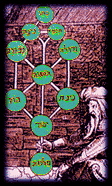|
History:
 In
the summer of 1997, Sean and Silver started up an email list targeted to the gothics
of the Dallas/Fort Worth Metroplex. They had met each other on the Texas regional
gothic list, the SWGoths (Southwest Gothics), and became friends once Silver moved
up to DFW from Central Texas. Both of them noticed that there seemed very poor
representation of Dallasites on the SWgothlist (considering that the city hosted
the longest-running gothclub in the state -- The Church), and they started making
inquiries to see why this was. They quickly ascertained that a good number of
Dallas-area goths had net access, but didn't join SWgoth out of the perception
that the regional list contained mention primarily of Austin events. Silver persuaded
the SWgothlist host, Mr.Bill, to set up a side list for use by the Dallas gothics,
despite Bill's previous nonsuccessful attempts at getting other city lists to
operate as well as SWgoth. In
the summer of 1997, Sean and Silver started up an email list targeted to the gothics
of the Dallas/Fort Worth Metroplex. They had met each other on the Texas regional
gothic list, the SWGoths (Southwest Gothics), and became friends once Silver moved
up to DFW from Central Texas. Both of them noticed that there seemed very poor
representation of Dallasites on the SWgothlist (considering that the city hosted
the longest-running gothclub in the state -- The Church), and they started making
inquiries to see why this was. They quickly ascertained that a good number of
Dallas-area goths had net access, but didn't join SWgoth out of the perception
that the regional list contained mention primarily of Austin events. Silver persuaded
the SWgothlist host, Mr.Bill, to set up a side list for use by the Dallas gothics,
despite Bill's previous nonsuccessful attempts at getting other city lists to
operate as well as SWgoth.
 The
list grew slowly at first, but by the end of the first year of operation there
were around 140 members. More importantly, dialogues about improving the gothic
scene of the area had begun, and members sought ways of improving the number and
quality of events available. The
list grew slowly at first, but by the end of the first year of operation there
were around 140 members. More importantly, dialogues about improving the gothic
scene of the area had begun, and members sought ways of improving the number and
quality of events available.
 At
this point, hosting of the list had been moved to Silver's Necronom.com server
to improve his and Sean's ability to maintain the list. This had followed in the
wake of a brief outage when Mr. Bill changed jobs and was unable to provide service
for a short while. At
this point, hosting of the list had been moved to Silver's Necronom.com server
to improve his and Sean's ability to maintain the list. This had followed in the
wake of a brief outage when Mr. Bill changed jobs and was unable to provide service
for a short while.
1999
Changes:
 Sean
and Silver have now decided that operation of the Dallas Gothics List (DGL) needs
a change. The list membership has exceeded 300 email addresses, and their ability
and desire to handle all requests coming through has not kept up adequately. While
the demands upon their time have increased, their personal time available for
working on the list and website has, if anything, decreased. Sean
and Silver have now decided that operation of the Dallas Gothics List (DGL) needs
a change. The list membership has exceeded 300 email addresses, and their ability
and desire to handle all requests coming through has not kept up adequately. While
the demands upon their time have increased, their personal time available for
working on the list and website has, if anything, decreased.
 They
reviewed options for fixing this state of affairs and hit upon an idea: turn the
list administration over to a committee. This concept satisfies a long list of
needs. They can reduce the demands on their time somewhat; increase the ability
to handle list issues; solve the problem of what happens when admins are out of
touch while traveling; give the membership a more democratic oversight; empower
others to have greater influence within the community; distribute the duties among
a handful of people so that it isn't burdensome upon anyone; and broaden the scope
of services offered, perhaps. They
reviewed options for fixing this state of affairs and hit upon an idea: turn the
list administration over to a committee. This concept satisfies a long list of
needs. They can reduce the demands on their time somewhat; increase the ability
to handle list issues; solve the problem of what happens when admins are out of
touch while traveling; give the membership a more democratic oversight; empower
others to have greater influence within the community; distribute the duties among
a handful of people so that it isn't burdensome upon anyone; and broaden the scope
of services offered, perhaps.
|








 ca·bal
(k&-'bäl) Function: noun
ca·bal
(k&-'bäl) Function: noun